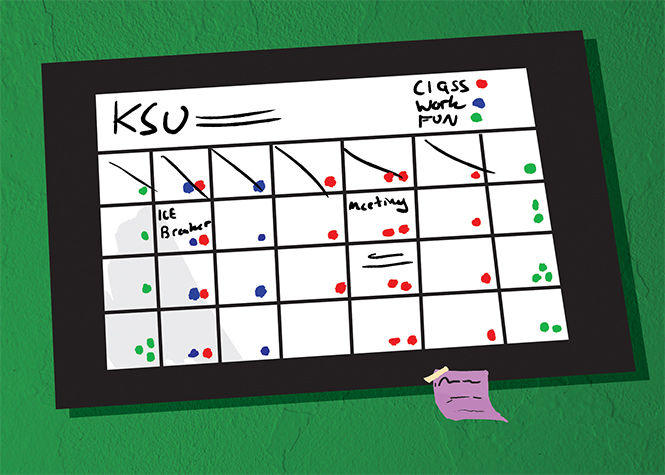Learning the ropes: Freshmen find their own routines
September 23, 2014
A fourth of the way into the semester, incoming freshman are starting to get settled in at Kent State. The students are exercising their independence, meal plan options and developing study habits as they adapt to college life.
Some, such as Katie Dosen, an 18-year-old freshman exploratory major, are even exploring college parties whenever they can. Dosen admits to partying every weekend, though she makes sure that her homework is taken care of so she can be free.
On the other hand, Roberta Gregory-Davis, a freshman athletic training major, said she rarely goes out to party.
“I’m not really a party person,” she said. “I’d rather stay in and watch movies.”
When it comes to choosing what to eat, Davis said she mostly eats on campus, but allows herself to eat out at least once a week.
Ben Pikus, a freshman construction management major, said he almost always eats on campus because of his meal plan.
“It’s a lot easier to get food on campus than it is to use my own money,” he said, though he doesn’t worry about using up his meal plan.
“You can spend like $18 each day and have $10 left over at the end of the semester,” he said. “I did the math.”
Pikus said he doesn’t feel homesick, because he lives 35 minutes away from campus. Dosen felt the same way.
Gregory-Davis, however, became homesick after the first couple of weeks, when her god-sister gave birth to a baby. She had been present for the entire pregnancy and then had to miss the child’s birth.
“That’s when I was the most homesick,” she said. “That’s when I was ready to go home.”
Homesickness is just one of the hurdles a new student has to get over. Gregory-Davis said the hardest thing for her to overcome was time management. There are no immediate repercussions for skipping class or assignments like there were in high school.
“That’s the hardest part of it — time management,” she said.
Morgan Clark, an assistant at the TRIO Student Support Services Writing and Humanities Center, said she struggled with taking deadlines seriously. She would get frustrated when Blackboard assignments locked her out for being late, but overcame the obstacle by using a planner and placing two calendars in her room.
“I bring my planner everywhere,” Clark said. “It’s being aware of assignments.”
Developing study habits is another obstacle for new students to overcome. Pikus said he has to study often to stay up-to-date with the material.
Dosen said she waits until the night before an exam to study and then uses note cards to prepare.
“I already had three exams,” she said. “I made note cards for each.”
Davis and her boyfriend study by quizzing each other on class material. They have used this same system since high school, but do it more often now that they are in college.
There are campus resources available to help student become acclimated to the college environment. Clark works for Trio, which offers peer mentoring and tutoring for students who come from low-income families, are first generation college students or have disabilities.
“Take advantage of the free programming,” Clark said. “I know a lot of people don’t have the opportunities to come in for our program, but there’s university tutoring and SSI and more.”
She said using the university’s resources could make a big difference in a freshman’s first-year experience.
“We have received feedback from students who said they wouldn’t have passed a class if they hadn’t received tutoring,” Clark said.
Davis was a part of the Academic STARS program, a summer program that helps minority students prepare for college, and said the experience helped her a lot.
“It makes me more secure to know coming here I have a support system and I am going to be held accountable for what I do and how I act,” Davis said. “Even before coming here in the fall I had someone to lean on.”
With the bulk of their first semester still ahead of them, freshmen still have time to get in the groove of college life. Clark advised students to join clubs and make strong connections with professors, because making connections in college can go a long way.
Contact Cheyenne Perry at [email protected].












